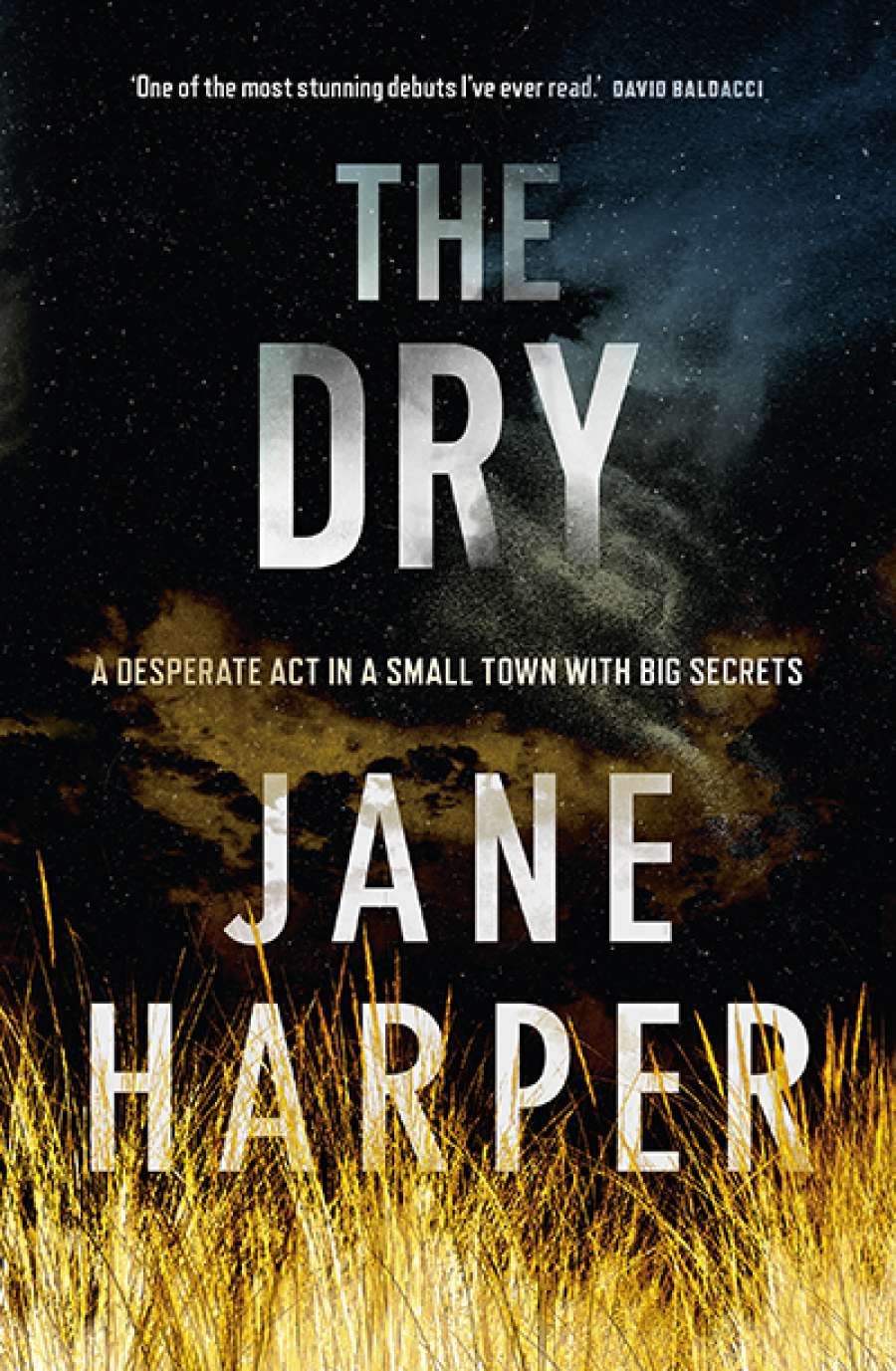
- Free Article: No
- Contents Category: Fiction
- Custom Article Title: Chris Flynn reviews 'The Dry' by Jane Harper
- Custom Highlight Text:
There is an odd moment halfway through The Dry when Aaron Falk, the Federal Police officer unofficially investigating the apparent murder–suicide of the Hadler family ...
- Book 1 Title: The Dry
- Book 1 Biblio: Pan Macmillan $32.99 pb, 340 pp, 9781743548059
The book contains a clue, however, so he has to show it to the local officer in charge, Greg Raco, who rolls his eyes when Falk describes the plot as 'a female detective investigating a string of student deaths at a college in the US'. Sergeant Raco's response? 'Sounds crap.'
Using your first crime novel to take a swipe at the kind of formulaic American crime thrillers found in supermarkets could be a moment of satirical joy, were it not for the uncomfortable fact that The Dry seems to be exactly the same kind of Kmart-bound book, albeit with an Australian setting. An unkind reader might be tempted to describe Jane Harper's début in exactly the same terms with which Falk expresses his disdain for American pulp.
The plot here revolves around a male detective investigating a string of family deaths at a farm in rural Victoria. Falk, who works for the financial intelligence unit of the Federal Police in Melbourne, has reluctantly returned to his drought-ravaged home town of Kiewarra to attend the funeral of his best friend from high school, Luke Hadler. Possibly under financial pressures linked to the failing local economy, Hadler appears to have murdered his wife and six-year-old son with a shotgun, before turning the weapon on himself. Falk is asked by Hadler's disbelieving parents to sniff around and follow the money trail. He feels obliged to do so, as Luke provided him with a dubious alibi for the mysterious death of a girl, Ellie Deacon, when they were teenagers. Her drowning and the weight of suspicion that fell on Falk and his father had forced them to leave town years prior.
Such a story could easily be ripped from the headlines. Suicide rates are significantly higher for both men and women in rural areas, and reports of rural Australians pushed to breaking point in drought conditions across the nation are all too common. Harper's unromantic portrayal of the pressures of country living is one of the novel's strengths. Life in Kiewarra is much harsher than any of the blow-ins from the city believe. Deep grudges are held, and the twitchy locals give Falk a terrible time of it. He is accused of interfering with children in the park and berated by unhinged thug Grant Deacon (Ellie's brother); his car is vandalised and covered with faeces. It is refreshing, though far from comforting, to have the notion of Pleasantville, Australia so definitively skewered.
Granted, this is a first novel, but anyone used to the complex characters, detailed settings, and measured prose found in the majority of Australian crime writing – a genre packed with talented practitioners that punches well above its weight – will quickly realise The Dry is a very different beast. On several occasions, Falk remarks that people do not think what he does is real police work, and it is indeed hard to argue that he is anything other than a dull-as-ditch-water auditor. The supporting characters – for the most part one-dimensional cyphers squeezed out of a central casting template – are no better. Kiewarra itself, which arguably should be the strongest character of all, resembles the set of an old western, with no substance behind the plywood façade.
 Drought-ravaged earth (image courtesy of CSIRO via Wikimedia Commons)This constructed atmosphere pervades the story. Nothing feels authentic here. Even the villain, when he or she is finally revealed, abruptly becomes a giggling lunatic, so out of tone with their earlier behaviour, one suspects they must have fallen into a vat of toxic slurry and emerged as The Joker.
Drought-ravaged earth (image courtesy of CSIRO via Wikimedia Commons)This constructed atmosphere pervades the story. Nothing feels authentic here. Even the villain, when he or she is finally revealed, abruptly becomes a giggling lunatic, so out of tone with their earlier behaviour, one suspects they must have fallen into a vat of toxic slurry and emerged as The Joker.
Plot is also an issue. Italicised flashbacks pepper the text, fleshing out Falk's role in the death of Ellie Deacon. Her protracted story is dragged clumsily along behind the main investigation so that it culminates at the same time as the central thread. By that stage it is obvious what happened to her, and interest has waned. Meanwhile, Falk plods from one contrived situation and character to another, all seemingly pulled straight from the Thriller Writing 101 playbook.
Notwithstanding, The Dry will doubtless be a bestseller. There is so much marketing hoopla surrounding the overseas rights sales that it will no doubt be critic-proof. While it is always heartening that Australian writing be recognised beyond these shores, it is worrying that such bland fiction should fly the local flag. There is no artistry here, only artifice. The Dry is as flat and featureless as the landscape in which it purportedly takes place.


Comments powered by CComment